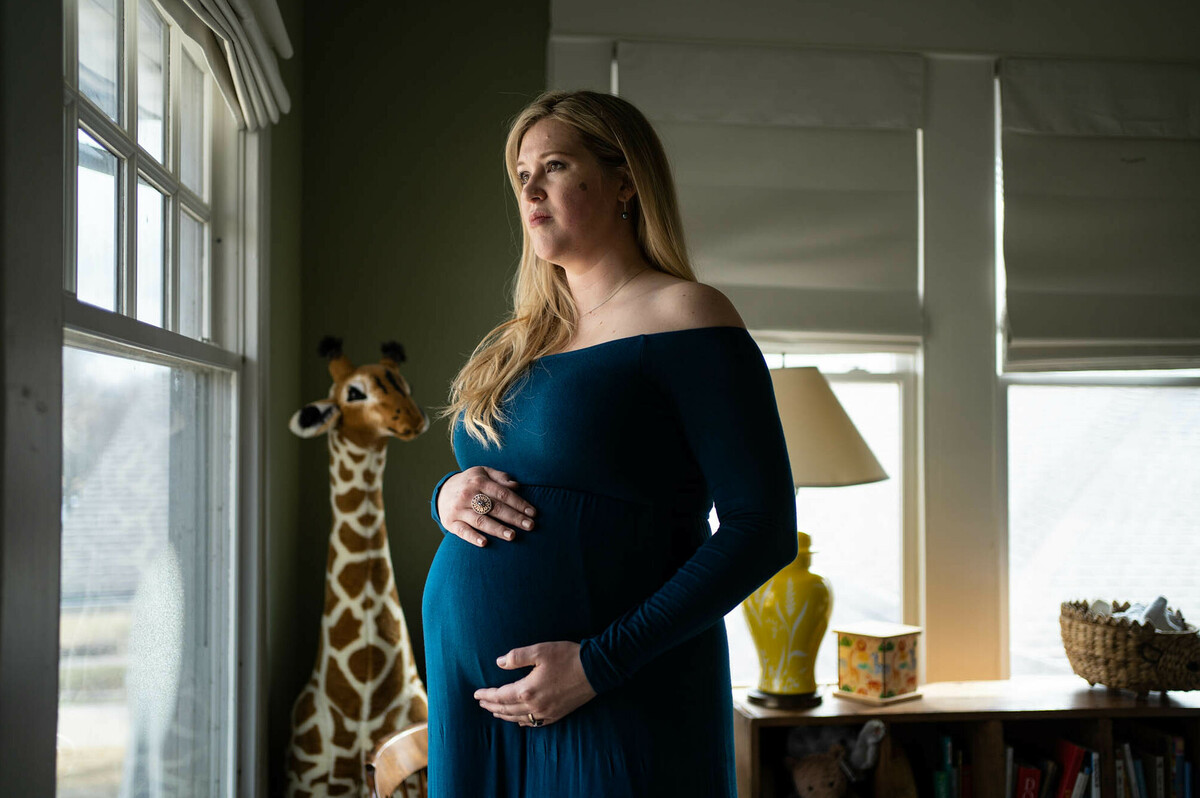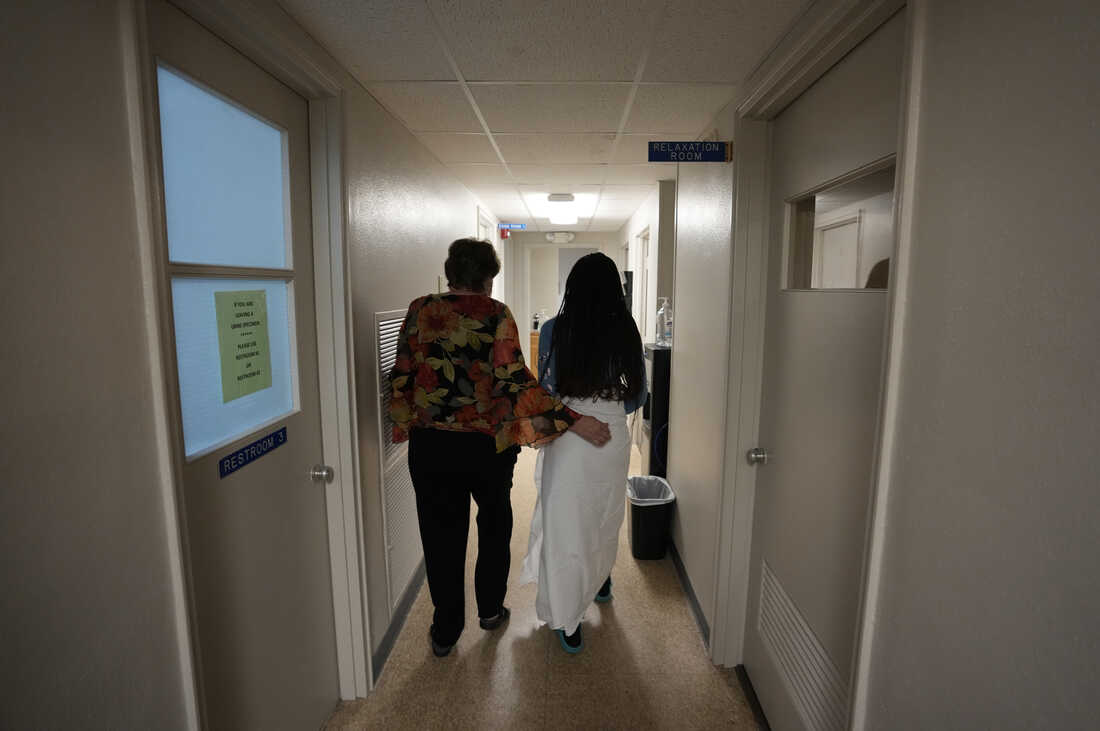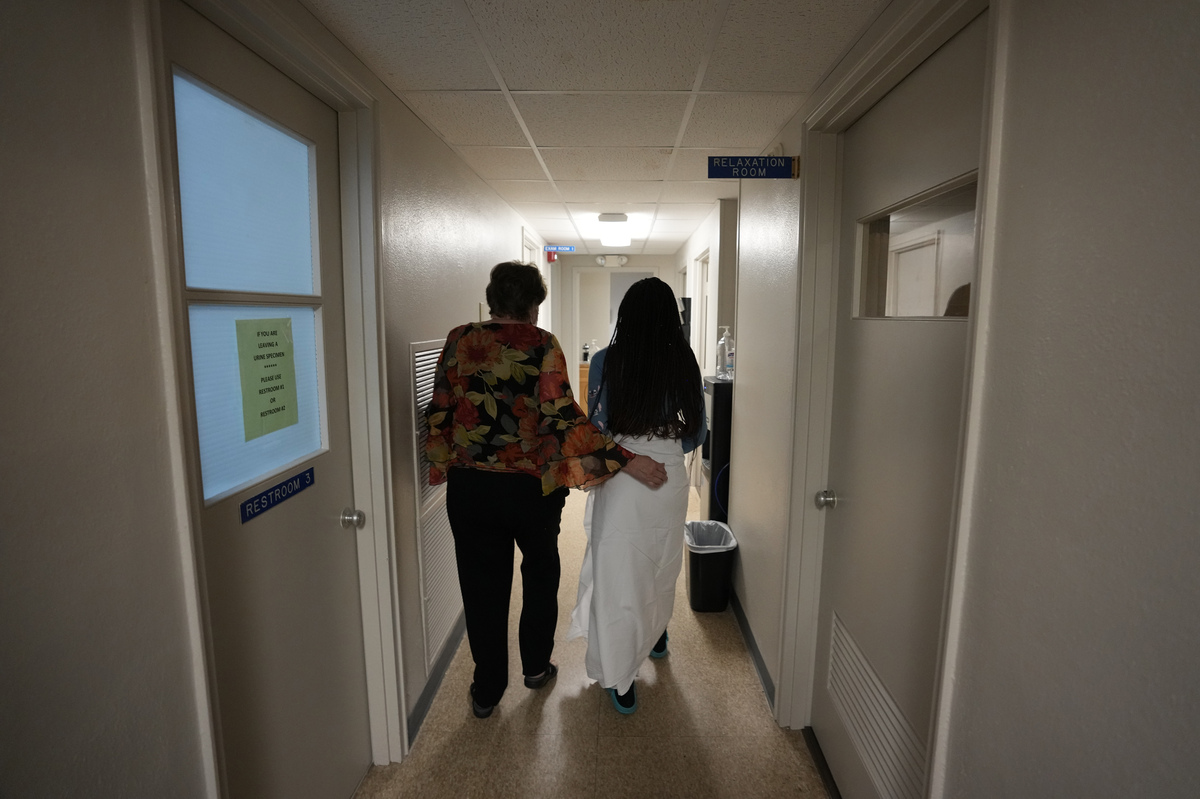3 abortion bans in Texas leave doctors ‘talking in code’ to pregnant patients

Lauren Miller, of Dallas, Texas, says that her state’s abortion laws added to the stress and turmoil her family faced after one of her twins was diagnosed with a fatal condition in utero.
Nitashia Johnson for NPR
hide caption
toggle caption
Nitashia Johnson for NPR

Lauren Miller, of Dallas, Texas, says that her state’s abortion laws added to the stress and turmoil her family faced after one of her twins was diagnosed with a fatal condition in utero.
Nitashia Johnson for NPR
This past fall, when Lauren Miller of Dallas was 13-weeks pregnant with twins, she got horrible news. One of the twins had trisomy 18, a genetic abnormality that causes about 90% of fetuses to die before birth. The other twin was healthy.
She learned from a genetic counselor that continuing to carry both fetuses could put the healthy one at risk. She saw a doctor who specializes in high risk pregnancies who told her: “You can’t do anything in Texas and I can’t tell you anything further in Texas, but you need to get out of state.”
That’s exactly what she did. Miller traveled to Colorado and, at 15-weeks pregnant, she had a “selective reduction” procedure to help ensure her pregnancy with her healthy twin could continue.
When she returned to Dallas and continued her prenatal care, she found herself navigating silence around abortion. She wondered, if the ultrasound technician knew she’d traveled out of state for an abortion, could she get reported? “You don’t know where anybody stands, so it feels like we’re all kind of talking in code,” Miller says.

What Miller did does not violate current abortion laws in Texas, legal experts say. But the fear among doctors and patients in the new legal landscape in Texas is extreme, to the point where — as Miller found — some doctors won’t say the word “abortion” in the exam room.
The first amendment of the constitution protects free speech, explains Elizabeth Sepper, professor of law at University of Texas at Austin. “Physicians have independent speech rights, to speak to their patients openly,” she says. “Physicians should not be scared to say the ‘a-word.'”
Nevertheless, that seems to be what’s happening. Many doctors in Texas who treat pregnant patients are extremely scared, especially of language in one of the state’s abortion bans that allows people to take civil action against anyone who “aids or abets” abortion.
Three overlapping abortion bans
“It’s just absolutely crippling,” says Lauren Miller’s OB-GYN, who asked that NPR not use her name because she is not authorized by her employer to speak with the media.
Many doctors are unwilling to speak publicly about this issue. A half dozen Texas OB-GYNs NPR contacted for this story didn’t respond or declined to comment.
“People are scared to talk,” says Dr. Andrea Palmer, an OB-GYN in Fort Worth. If a doctor acknowledges publicly that they counsel their patients on abortion, she adds, they might worry they would be set up by someone posing as a patient or family member looking to bait them into talking about abortion and then sue.
There are, in fact, three laws against abortion in Texas, explains Sepper. “We have the trigger ban that was recently enacted and comes along with up to life imprisonment for violation,” she says. “We have possibly the pre-Roe ban, which Texas officials are arguing is still in effect, and applies both to performance of an abortion and to providing the instrumentality or the means of an abortion. And then we have SB8 as a civil backstop, which prohibits aiding and abetting abortions.”
‘The weather’s really nice in New Mexico’
There is an exception in Texas law that allows abortion when a woman’s life or a “major bodily function” is in imminent danger. But it’s not uncommon for there to be pregnancy complications — like Lauren Miller’s — where many doctors would consider it to be the standard of care to offer abortion as an option. Those are the kind of circumstances where physicians feel like they can’t be fully truthful about a patient’s options without risking a lawsuit.
“I have colleagues who say cryptic things like, ‘The weather’s really nice in New Mexico right now. You should go check it out.’ Or, ‘I’ve heard traveling to Colorado is really nice this time of year,’ ” says Miller’s OB-GYN. Patients have to be well-educated enough to pick up on these hints, do their own research, and figure out what to do next. They also have to have the means to travel or find funding to do so, if they want to pursue abortion.
The doctor herself is careful not to put things in writing, and even having frank conversations with her patients about abortion options out-of-state — whether the conversations are in-person or over the phone — makes her feel vulnerable. “I am putting myself out there,” she says. “If a patient’s grandmother and or partner or sister finds out that I’ve talked to them about an abortion, and that’s something that really, really upsets them, all they have to do is find a lawyer and all of a sudden I’m ‘aiding and abetting’ someone into an abortion.”

A 33-year-old mother of three from central Texas is escorted down the hall by a clinic administrator prior to getting an abortion, at Hope Medical Group for Women in Shreveport, La., in late 2021. More than a dozen patients, mostly from Texas, arrived at the abortion clinic in Louisiana.
Rebecca Blackwell/AP
hide caption
toggle caption
Rebecca Blackwell/AP

A 33-year-old mother of three from central Texas is escorted down the hall by a clinic administrator prior to getting an abortion, at Hope Medical Group for Women in Shreveport, La., in late 2021. More than a dozen patients, mostly from Texas, arrived at the abortion clinic in Louisiana.
Rebecca Blackwell/AP
Still, these laws are not as sweeping as some seem to think, law professor Sepper says, and none should apply in Miller’s case.
“First, all of them exempt the pregnant person,” Sepper explains. “Second, none of them apply outside the borders of Texas, so abortions performed in Colorado or California are not covered.”
Amy O’Donnell of Texas Alliance for Life, an anti-abortion rights group, concurs with Sepper’s interpretation of the law. “Our Texas Alliance for Life attorneys believe there is a constitutional right to interstate travel,” she says. “They believe that Texas will not be able to ban interstate travel for abortion, just as we cannot ban individuals from traveling to another state to participate in casino gambling, which is not legal in Texas.”
Vague laws, silenced doctors
Still, whether doctors can openly counsel their patients without violating SB8 is a bit more complicated, and hasn’t been tested in court. “The law’s vague – it’s really poorly written, probably on purpose,” says Palmer, adding, “Nobody wants to be defendant number one on this.”
Sepper argues many doctors and hospital systems are overreading the Texas abortion bans, and should consider the ethical and professional obligations to give patients complete information about their diagnoses and options. “Providing information, even providing referrals, is not within the terms of SB8 or the criminal bans,” she says. When doctors and hospitals won’t discuss abortion because they’re afraid of lawsuits, she says, “I think it’s a real disservice to patients.”
The reticence on the part of some doctors can have devastating consequences. Dr. Eve Espey is chair of the OB-GYN department at the University of New Mexico, where more and more Texas patients come for abortions they can’t get at home.
“Those restrictive laws are increasing complex abortion care because people come later, and abortions later in gestation are more complicated,” Espey explains. One of the drivers of those delays is people having no idea that there are options out-of-state, she adds.
She recalls one Texas patient whose fetus had acrania, where the fetus has no skull. It’s a fatal condition for the fetus. “That was a doctor who didn’t tell her, ‘Go get care out-of-state,'” says Espey. “She was an immigrant. It took her six weeks to figure out she could travel to New Mexico for an abortion and get the logistics and finances together to be able to go.”
The patient ended up hemorrhaging and needing a hysterectomy. “This is a patient who — if she had been able to have that pregnancy termination at 11 or 12 weeks — very likely would not have lost her uterus the way she did when she was 16 to 17 weeks,” says Espey.
‘Why do the testing?’
Espey believes that there are many doctors in Texas who would like to provide more information to patients but are unsure if they can.
“The Texas abortion laws were designed to sow confusion and fear, and they’re working,” Espey adds. When doctors hear that abortion is illegal and anyone can sue them, they err on the side of caution, rather than practice up to the edge of what’s legally allowed. “People want to stay out of trouble, and physicians are no exception to that.”
One strange aspect of all this, Espey notes, is that pregnant women in Texas still have access to many genetic testing options, available as early as 10 weeks of pregnancy, and very little ability to act on that information.

Folders rest on a rack in a lab at Hope Medical Group for Women in Shreveport, La., in 2021. The nation’s most restrictive abortion law is driving many women from Texas to seek services in neighboring states.
Rebecca Blackwell/AP
hide caption
toggle caption
Rebecca Blackwell/AP

Folders rest on a rack in a lab at Hope Medical Group for Women in Shreveport, La., in 2021. The nation’s most restrictive abortion law is driving many women from Texas to seek services in neighboring states.
Rebecca Blackwell/AP
“Why do the testing?” she asks. “The urgency of early diagnosis is to provide early abortion care.”
Palmer, the doctor in Fort Worth, agrees. “We are asking questions that we can only provide limited resources for the answer,” she says. “And it is really frustrating as a physician to not be able to provide full care for patients.”
Lawmakers seem unlikely to change — or clarify — abortion bans
NPR reached out to five Republican Texas lawmakers to ask about Texas’s abortion laws and to get comment on Lauren Miller’s story, but none responded to our request. Attorney General Ken Paxton’s office also did not respond to NPR’s request to explain how the state plans to enforce Texas’s abortion laws, especially in relation to doctors and counseling.
Before the elections last fall, a few Republican Texas lawmakers signaled there may be changes to the state’s abortion laws coming, specifically, the addition of an exception for abortions of pregnancies that result from rape or incest. But Brendan Steinhauser, a Republican political strategist based in Austin, says his impression is that lawmakers aren’t eager to take up new abortion legislation, either to create more exceptions or more restrictions.
“I don’t hear a lot about it in the capital,” Steinhauser says. “I think that you’re probably not going to see a lot of change in the session this year. “
He sees very little political appetite for bringing abortion up again among Republicans lawmakers in the state, because Texas Republicans did well in the last election even after Roe v. Wade was overturned and the state’s abortion restrictions took effect. “I think Republican legislators realize, ‘We passed these bills into law, we weren’t punished at the ballot box,'” he says. “So what is the incentive to do anything different?”
O’Donnell of Texas Alliance for Life, one of the the groups in the state that lobbies for abortion restrictions, says her group is not currently advocating for more restrictions. “What we’re working for in this session is maintaining our pro-life gains,” she says, adding that the medical emergency exception currently in the law is “adequate.” Asked about doctors scared to counsel their patients about abortion when their patients are faced with complications that are not immediately life-threatening, she responded: “As far as doctors advocating for abortion, our goal is to make abortion not only illegal in our state, but unthinkable.”
There are some lawmakers in the state who would like to go further. The Texas Freedom Caucus, a group of a dozen legislators, released a list of priorities last month that includes “Stop those aiding and abetting out-of-state abortions by enforcing Texas law.” A spokesperson for the caucus did not respond to NPR’s interview request.
Angry, and motivated to speak out
Lauren Miller, the Dallas patient who had to travel 800 miles for an abortion, says that if not for the state of Texas and its restrictions, her doctors could have done much more to help her.
“They would have just been able to give information freely, get it scheduled,” she says. “It wouldn’t become this whole agonizing process of just trying to get information of — what do we actually need? Where do we go?”

Jason and Lauren Miller are expecting their second child in late March.
Nitashia Johnson for NPR
hide caption
toggle caption
Nitashia Johnson for NPR

Jason and Lauren Miller are expecting their second child in late March.
Nitashia Johnson for NPR
She’s been processing her experience, in between caring for her 1-year-old and preparing for the arrival of her baby at the end of March. She’s also civically engaged, she says. “I have no qualms, when something’s going on, calling a member of Congress, writing an email, staying informed, [sending] the letter to council.”
She’s angry she had to leave home for an abortion. She wanted to have that care at home in Texas. And she refuses to stay quiet about it.
Have you needed abortion care since Roe v. Wade was overturned? We are interested in your story if you feel comfortable sharing it.
Diane Webber edited the audio and digital stories. Meredith Rizzo did the visual design and development.
For all the latest Health News Click Here
For the latest news and updates, follow us on Google News.

